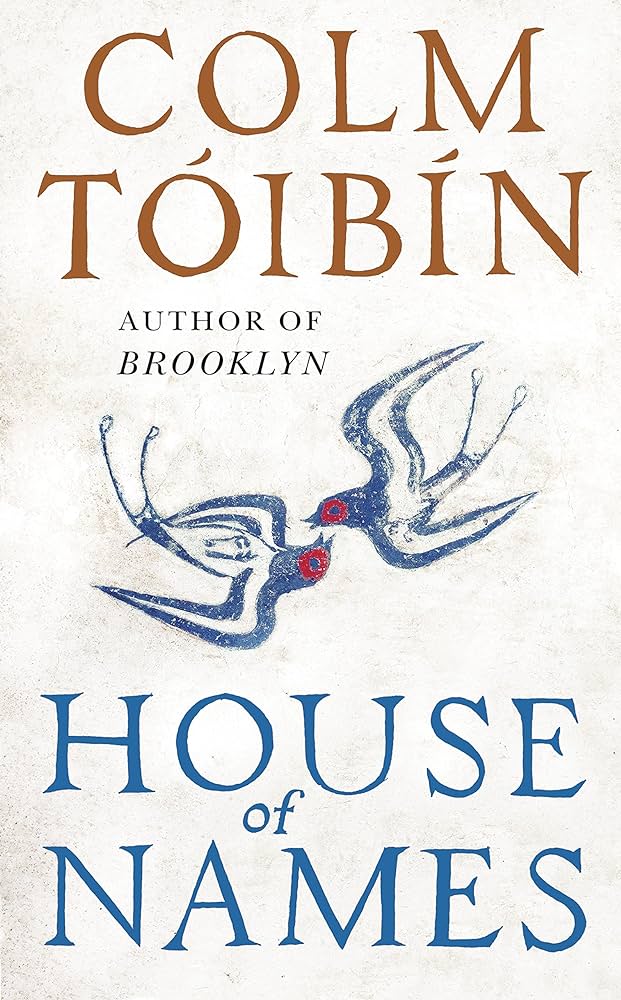'They cut her hair before they dragged her to the place of sacrifice. Her mouth was gagged to stop her cursing her father, her cowardly, two-tongued father. Nonetheless, they heard her muffled screams.'
On the day of his daughter's wedding, Agamemnon orders her sacrifice.
His daughter is led to her death, and Agamemnon leads his army into battle, where he is rewarded with glorious victory.
Three years later, he returns home and his murderous action has set the entire family - mother, brother, sister - on a path of intimate violence, as they enter a world of hushed commands and soundless journeys through the palace's dungeons and bedchambers. As his wife seeks his death, his daughter, Electra, is the silent observer to the family's game of innocence while his son, Orestes, is sent into bewildering, frightening exile where survival is far from certain. Out of their desolating loss, Electra and Orestes must find a way to right these wrongs of the past even if it means committing themselves to a terrible, barbarous act.
House of Names is a story of intense longing and shocking betrayal. It is a work of great beauty, and daring, from one of our finest living writers.
Part of Toibin's success comes down to the power of his writing: an almost unfaultable combination of artful restraint and wonderfully observed detail . . . Unforgettable -- Mary Beard ― New York Times
A giant amongst storytellers, Toibin has thrown down the gauntlet with his latest novel .. . And it is a masterpiece -- Edith Hall ― Daily Telegraph
A gorgeous stylist, Tóibín captures the subtle flutterings of consciousness better than any writer alive . . . Never before has Tóibín demonstrated such range, not just in tone but in action. He creates the arresting, hushed scenes for which he's so well known just as effectively as he whips up murders that compete, pint for spilled pint, with those immortal Greek playwrights ― Washington Post
Brilliant retelling of a Greek Tragedy... This is a novel that is a celebration of what novels can do. -- Alex Preston ― Observer
Considerable Game of Thrones appeal...instead of cheap narrative tricks and resolutions we're left with images of desolation and thwarted love ― Financial Times
A devastatingly human story...savage, sordid and hauntingly believable ― Guardian
The book has a controlled hushed quality, like that of a Morandi still life, which only serves to heighten the terror and pity of the tale -- John Banville
Colm Tóibín turns Greek Myths into flesh and blood..The writing is characteristically elegant, spare and subtle. ..The scenes between Clytemnestra and her lover Aegisthus darkly sexy ― The Times
An extraordinarily sympathetic and intimate portrait ― Literary Review
In Toibin's careful hands, the story of Clytemnestra, who avenges her daughter after her husband Agamemnon sacrifices her to secure safe passage from Troy, is told with such a vivid grasp of the emotional pulse that even those who know the story well will be transfixed. -- Claire Allfree ― Daily Mail
What is truly miraculous, though, is how Tóibín has made us sympathize with people who do terrible, unthinkable things ― Boston Globe
A dramatic, intimate chronicle of a family implosion set in unsettling times ― Publishers' Weekly
If there is a more brilliant writer than Tóibín working today, I don't know who that would be -- Karen Joy Fowler
This is a novel about the way the members of a family keep secrets from one another, tell lies and make mistakes.. . ― Literary Review
Tóibín's retelling is governed by compassion and responsibility, and focuses on the horrors that led Clytemnestra to her terrible vengeance. Her sympathetic first-person narrative makes even murder, for a moment, seem reasonable (...) Tóibín's prose is precise and unadorned, the novel's moments of violence told with brutal simplicity. But its greatest achievement is as a page-turner. In a tale that has ended the same way for thousands of years, Tóibín makes us hope for a different outcome ― The Economist
[An] intense, thought-provoking and original novel . . . Toibin's book transforms this ancient story into a lyrical, melancholy meditation on closeted desire, which implicitly comments on the aftermath of the Irish Troubles' -- Emily Wilson ― TLS
Graphic, vicious, beautiful retelling of ancient myths.... Ultimately the book is a stark, timeless and brilliantly rendered tale of power in a world, as ever, riven by conflict. ― 'I' Newspaper
In a novel describing one of the Western world's oldest legends, in which the gods are conspicuous by their absence, Tóibín achieves a paradoxical richness of characterisation and a humanisation of the mythological, marking House Of Names as the superbly realised work of an author at the top of his game. ― Daily Express
A spellbinding adaptation of the Clytemnestra myth, House of Names considers the Mycenaen queen in all her guises: grieving mother, seductress, ruthless leader - and victim of the ultimate betrayal. ― Vogue
A haunting story, largely because Tóibín tells it in spare, resonant prose... -- Lucy Hughes-Hallett ― New Statesman
A Greek House of Cards... Just like Heaney at the end of his Mycenae lookout, Toibin's novel augurs an era of renewal that comes directly from the cessation of hostilities. -- Fiona Macintosh ― Irish Times
The book's mastery of pacing and tone affirm the writer as one of our finest at work today. -- John Boland ― Irish Independent
A daring, and triumphant return, to the Oresteia... bleakly beautiful twilight of the Gods. -- Boyd Tonkin ― The Arts Desk
It couldn't have been done better ― Scotsman
A visceral reworking of Oresteia ― Observer
The escalation of violence and desire for revenge has deliberate echoes of the Irish Troubles ― Observer Books of the Year


